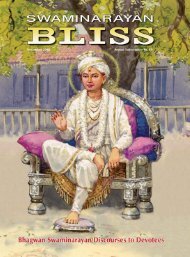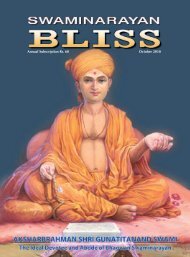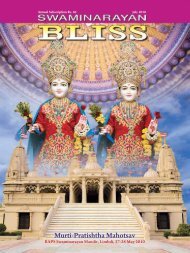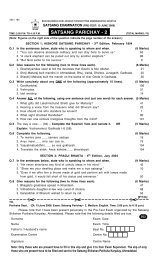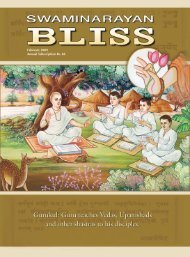August 2009 Annual Subscription Rs. 60 - Swaminarayan Sanstha
August 2009 Annual Subscription Rs. 60 - Swaminarayan Sanstha
August 2009 Annual Subscription Rs. 60 - Swaminarayan Sanstha
Create successful ePaper yourself
Turn your PDF publications into a flip-book with our unique Google optimized e-Paper software.
is the ãtmã of this whole world, of all karmas<br />
and of even Aksharbrahman itself. Thus showing<br />
Paramãtmã’s supreme control and pervasiveness.<br />
There are many mantras in this Upanishad which<br />
sing the extraordinary glory of Paramãtmã, but<br />
when it says, '¥ÿæÚUæÌ÷ ÂÚUÌÑ ÂÚUÑ' – ‘Aksharãt parataha<br />
paraha’ (Mundaka Upanishad: 2/1/2), all this<br />
glory is encompassed within that. This means that<br />
whatever characteristics Aksharbrahman has, like<br />
being the cause of creation, pervasive and the<br />
supporter of all, etc., they are all subject to the wish<br />
of Parabrahman, who is above Aksharbrahman.<br />
Thus the glory of Paramãtmã has been<br />
sung in a unique way. Hence, to understand<br />
Purushottam’s true greatness it is necessary to<br />
know Aksharbrahman. So, the purpose of this<br />
Upanishad can be understood clearly.<br />
Along with this let us also understand another<br />
fact. In this Upanishad the glory of Paramãtmã<br />
has been sung as ‘Aksharãt parataha paraha’, i.e.<br />
superior with respect to Akshar. Therefore it is<br />
also clear that the entity referred to as Akshar in<br />
this Upanishad is not Paramãtmã.<br />
Truly, the three words, ‘Aksharãt parataha<br />
paraha’ contain everything. The glory of Akshar,<br />
the glory of Purushottam and the eternal difference<br />
between the forms of these two entities, Akshar<br />
and Purushottam.<br />
CONCLUSION<br />
Thus, in this Upanishad, Angirã Muni, clearly<br />
explains the forms and divine characteristics of<br />
the two divine entities, Akshar and Purushottam.<br />
This is brahmavidyã, this is parãvidya, this is<br />
adhyãtmavidyã, and this is the principle of<br />
Akshar-Purushottam. For this very reason, the<br />
Akshar-Purushottam principle echoes in the<br />
mantra ‘ØðÙæùÿæÚ¢U ÂéL¤á¢ ßðÎ âˆØ¢ Âýôßæ¿ Ìæ¢ ÌžßÌô Õýræïçßlæ×÷’<br />
– ‘Yenã’ksharam purusham veda satyam provãcha<br />
tãm tattvato brahmavidyãm’ (Mundaka Upanishad:<br />
1/2/13). Or, at the very least, one cannot but feel<br />
as though this mantra resonates as a synonym to<br />
the Akshar-Purushottam principle.<br />
How can we imbibe this brahmavidyã? Who is<br />
Parabrahman? Who is Aksharbrahman? What is the<br />
place of Aksharbrahman and of Parabrahman in our<br />
spiritual endeavours? If we attain this brahmavidyã<br />
completely, what fruits will be achieved? Many<br />
other subtle secrets still fill this Upanishad. We will<br />
explore these in the next issue.<br />
<br />
(contd. from p. 8)<br />
someone, then try stopping yourself from lashing<br />
out at them. Try putting yourself in their shoes.<br />
The reason for their actions may be something that<br />
you may not know about. Just pausing for a few<br />
seconds can make a big difference!<br />
Let’s relate back to our scenario. If taken from a<br />
different perspective, what could have been done<br />
to ensure a more positive outcome? I could have<br />
approached the situation in a calm manner and<br />
tried to think of a valid reason for the colleague’s<br />
actions. By yelling at him, I don’t even provide him<br />
the opportunity to explain himself. Also, yelling<br />
does not change what happened in the past and<br />
does nothing for the future except destroy a work<br />
relationship with fellow colleagues.<br />
CONCLUSION<br />
From our scenario it becomes apparent that<br />
although during difficult situations where we<br />
have this urge to just let out our anger, the reality<br />
is that by doing so, it accomplishes nothing.<br />
Rather, it makes the situation worse and results<br />
in hurt feelings among the people around us.<br />
So the next time we have the desire to scream<br />
and yell, we should take a step back and think<br />
about the effects our anger can have later on.<br />
Also, remember that we may not always know the<br />
situation and the reasons for why things happened<br />
the way they did and so we have no right to make<br />
a judgement. Rather, as Swamishri has suggested,<br />
the immediate solution is as simple as saying<br />
‘<strong>Swaminarayan</strong> <strong>Swaminarayan</strong>.’<br />
<br />
<strong>August</strong> <strong>2009</strong> <strong>Swaminarayan</strong> Bliss 13



